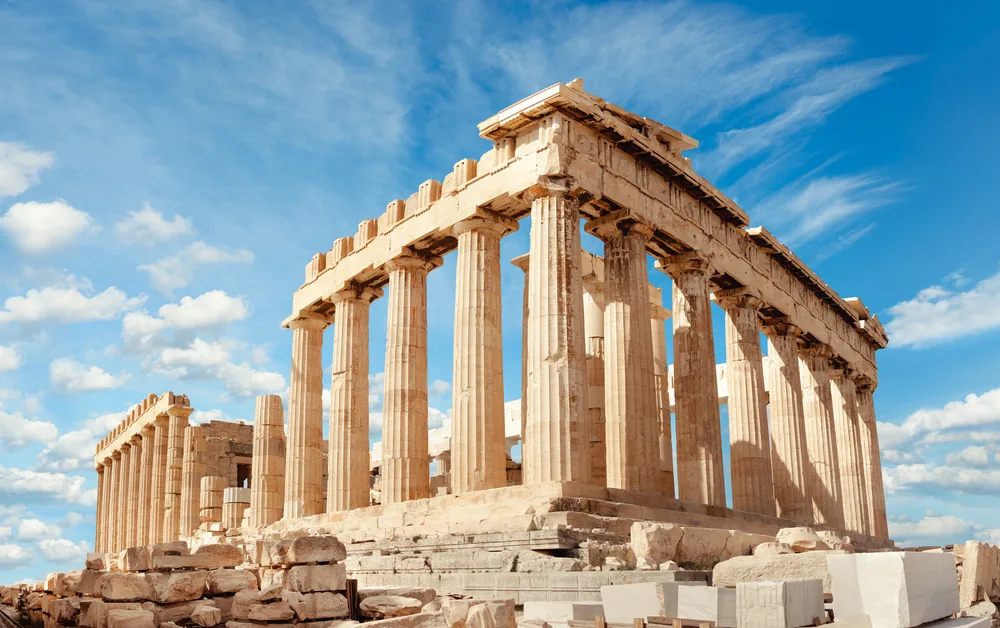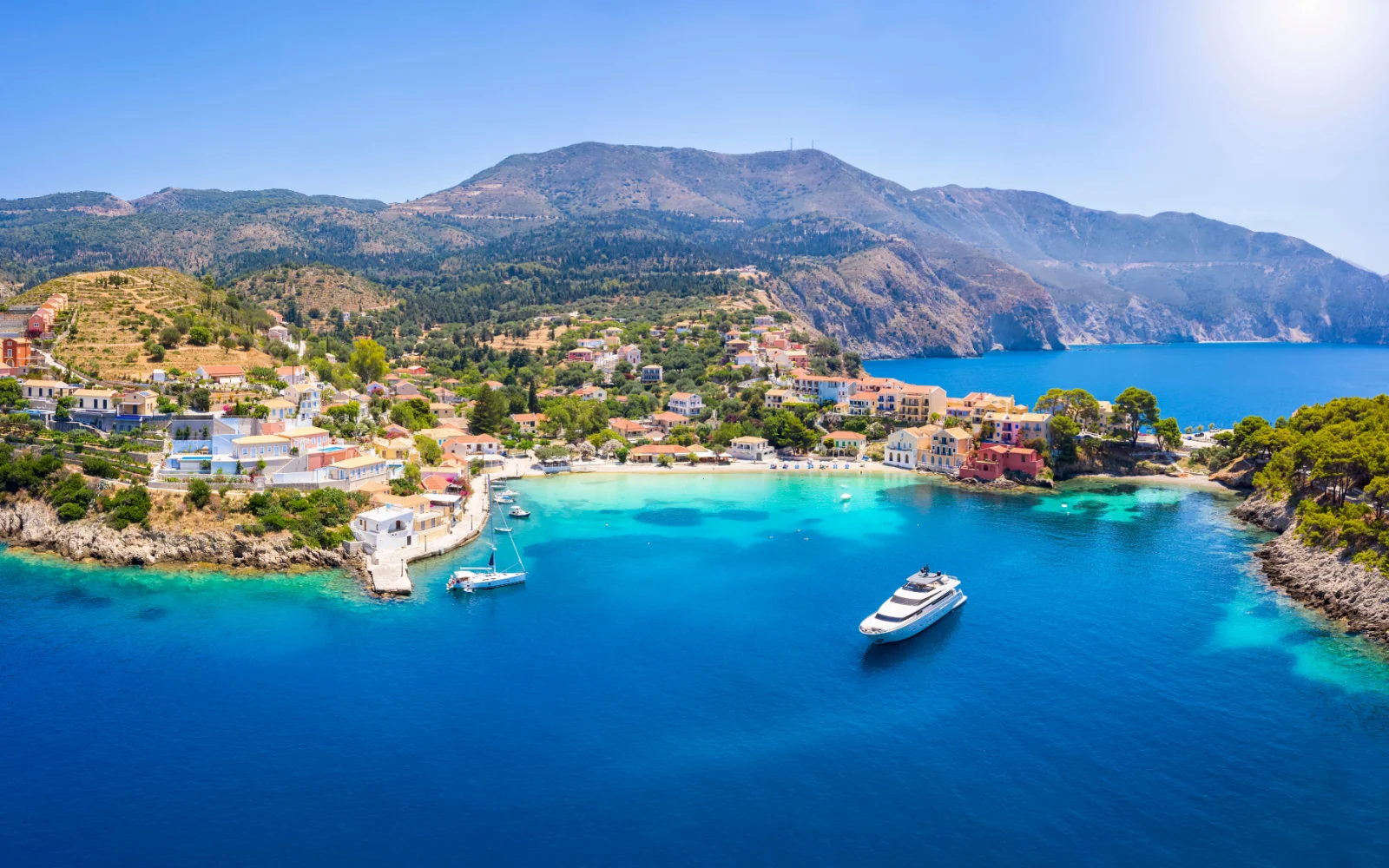Who hasn’t dreamed of spending a summer in Greece lounging by the turquoise waters of Santorini and exploring the ruins of the Acropolis? Obviously not on the same day!
Greece is one of those exciting destinations that provides visitors with several distinct vacation experiences. You can go get your history buff on, be a beach bum, or enjoy something in between.
A vacation in Greece is all that you’ve imagined and more. In addition to the Greek Isles and Athens, there are plenty of other less-traveled areas to explore. And be sure to pack your appetite, Greek food is some of the best on the planet!
25 Fun Facts About Greece
These fun and interesting facts about Greece can help you understand this unique country a bit more. There’s a lot to see and do in this fascinating country, and the more you understand about its long history, the more you’ll appreciate your visit.
And, the more familiar you are with the country, its culture, and what it has to offer visitors, the better able you’ll be to plan your dream vacation.
Here are a few facts across a wide range of topics to provide you with a bit of an overview of this beautiful and captivating country. We bet your first visit won’t be your last!
1. 80% of Greece is classified as mountainous terrain.

Georgios Tsichlis/Shutterstock
If you’ve seen those pictures of Greece that show narrow, winding streets and steep hills, you have an idea of what to expect when you arrive. Greece is hilly and steep and requires visitors to pack sturdy shoes!
Another sub-fact to this one is that due to this mountainous terrain, there are no rivers in the country that are navigable.
2. This is a very homogenous country, with 98% of the citizens considered ethnically Greek.
It’s not that it’s an unwelcoming place, it’s just that there hasn’t been a lot of immigration into the country. The few non-Greek people living there hail mostly from the nearby countries of Turkey, Armenia, and Albania.
3. Greece was a late adopter of literacy.
Yes, we were surprised too. It’s amazing that the “birthplace of civilization” had a literacy rate of an eye-popping 30% in the 1950s. Today’s rate of adult literacy of 95% is much more in line with most people’s expectations. Those Greeks are fast learners!
4. If you have a marble countertop, there’s a pretty good chance it originated in Greece.
An astounding 7% of all the marble that exists in the world is from Greece. This might sound like a small number, but when you stop to think that it means that all of the marble, everywhere is included, it becomes a lot more impressive.
5. Athens wasn’t always the booming metropolis that we know it to be today.

Nick N A/Shutterstock
In 1834 the capital had an estimated 10,000 residents compared to today’s 3.6 million (as of 2001). It’s also notable that more than 40% of the current population of the country lives in or around Athens.
6. The country of Greece includes over 2,000 islands but not all of them are inhabited.
Yes, that’s correct and not a typo, 2,000 different islands! Only 170 are actually populated, but still, that’s a lot of islands. Crete is Greece’s largest island and measures 3,189 square miles.
7. Men are required to serve a stint in the Greek military.
Once they reach adulthood, all of the men in the country have to serve in the military. These stints can last from one year to 18 months, and all branches of service are possible options. As a whole, the country spends about 6% of its yearly GDP on military activities.
8. People in Greece live longer than citizens of the US.
After we visited Greece for the first time, this made a lot more sense. The people have strong family and community ties, eat lots of fresh produce and fish, and are more active climbing up and down all those hills!
Its rank of 26 in the world life expectancy tables corresponds to an average life span of 77 years for men and 82 years for women. For comparison, the US is ranked number 49.
9. If you run a merchant ship in Greece, the majority of your crew must be Greek.

Aerial-motion/Shutterstock
Shipping is another source of pride in Greece, right up there with olive oil and olives! Merchant ships that operate in the country have to have a crew that’s composed of at least 75% of Greeks. And, of all the merchant ships that operate in the European Union, 70% were built in Greece.
10. Some of the olive trees growing in Greece today were planted in the 13th century.
That’s a lot of olives! To put this fun fact in perspective, consider that you could eat an olive during your visit that came from a tree that’s been in existence longer than our country.
Wow. Consider our minds blown. That’s a great illustration of just how long Greece has been around.
11. The family unit in Greece is strong.
Did you know that there are very few, like a minuscule number, of “old folks homes” in Greece? The Greek family unit is a strong one, and it’s very unusual for elderly people to live on their own or in a home.
If you’re Greek and belong to a traditional family, you can expect to live at home until you marry and also die at one of your children’s homes surrounded by family members.
12. More people visit Greece in a year than live there!
Yes, this is one fun fact! If you have your heart set on a visit to Greece, you’re definitely not alone. In the average year, roughly 16.5 million tourists visit.
Compare that number with the population of the country which was an estimated 10.4 million in 2021. In fact, tourism makes up a hefty 16% of the overall Gross Domestic Product (GDP) produced by Greece.
13. When you’re in Greece, you’re sure to notice that almost everything is painted kyanos, the popular shade of blue.

Kite_rin/Shutterstock
Yes, that blue that see in travel photos of the Greek Isles has a name. Not only is kyanos an incredibly popular color, but it’s also one that’s believed to help ward off evil spirits. This explains why you see it on almost every church dome and so many doors.
14. Greece has a national cheese, and no surprise, it’s Feta.
Feta is the goat cheese delicacy that’s been around since the time of Homer and his Odyssey. You’ll probably be shocked (not) to learn that Greece has the world’s highest consumption rate of Feta per capita.
15. Birthday celebrations just aren’t a thing in Greece.
Weird, right? As much as this would disappoint most Americans, the custom of annual birthday celebrations in Greece is highly unusual. Instead, you celebrate your “name day” every year.
In Greece, everyone’s named after a saint, so you celebrate every year on their big day. It’s an interesting concept for sure.
16. Greece isn’t very big; it’s roughly the same size as the state of Alabama.
For a small country, Greece sure packs a mighty punch! There’s a lot to see and experience in a small area. So much so, you might just have to plan another visit soon.
17. According to the Greeks, the Parthenon Marbles were stolen by the English and should be returned.

tilialucida/Shutterstock
Not to court controversy, but the topic of the Parthenon (or Elgin) Marbles might come up during your visit, and you should know what all the fuss is about.
These stones are located in the British Museum but the Greeks claim they were stolen. The matter is still playing out in the court of public opinion.
18. Cremation is forbidden if you’re a member of the Greek Orthodox Church.
Most Greeks are members of the Orthodox Church and are buried according to their traditions. Because of the shortage of available land in today’s Greek cemeteries, bodies are exhumed after a period of about five years.
Their bones are then cleansed in wine and placed in an ossuary, thus freeing up that spot for someone else.
19. Greece boasts an approximately 9,000 miles of coastline.
It’s ranked 10th in the world when it comes to the length of coastlines, an impressive statistic, especially for water lovers. When you’re on vacation in Greece, the farthest you’ll ever be from the water is an amazing 85 miles.
20. Cleopatra was Greek.
Often thought to be from Africa, and usually claimed by the Egyptians, many people don’t realize that Cleopatra was in fact Greek. Although she didn’t live long in Greece, nor did she ever rule over her native land, she’s a Greek.
21. Greek workers enjoy a generous vacation program.

BearFotos/Shutterstock
Hold on to your hats, Americans. Workers in Greece are allotted at least a full month of vacation each year. That’s right a minimum of four weeks of paid vacation. Yeah, we’re jealous. We’d spend at least some of our annual leave in, you guessed it, Greece.
22. Unemployment averages around 10% in Greece.
Okay, we might not have robust vacation schedules, but the US does enjoy a healthy rate of employment. The same can’t be said in Greece as jobs are hard to come by.
A college education isn’t even enough to guarantee a well-paying job. We guess it’s really true, that everything’s a trade-off.
23. The country’s national anthem is a long one, as it contains a whopping 158 verses!
We imagine that there’s an abbreviated version that’s played in most circumstances. But wow, that’s a lot of singing and an exceptional amount of lyrics to remember.
24. Greece had the world’s oldest currency until switching over to the Euro in 2002.
Here’s another fact that clearly illustrates just how long Greece has been around in some form or fashion.
Prior to adopting the Euro as its currency, Greece had the drachma. This form of currency was in circulation and in regular use for 2,650 years! It’s really difficult to fathom, isn’t it?
25. Voting is compulsory in Greece.

Greek citizens living abroad vote for the Greek legislative election at a polling station in Brussels, Belgium on May 20, 2023./Alexandros Michailidis/Shutterstock
Yes, you read that right. You have to vote if you’re a Greek citizen, it’s a requirement, not an option. We guess this makes sense as Ancient Greece was the birthplace of democracy.
Once you hit 18, you better get yourself to the voting booth. Actually, we would love to see this as a requirement everywhere!
Frequently Asked Questions
When is the best time to visit Greece?
Unsurprisingly, the best months to plan your trip to Greece are June through September, the same time period when kids are out of school and families are traveling.
If you’re looking for a time to visit when the weather is still great, but there are fewer crowds, take a look at going in April, May, or October. For a truly low-season vibe, try November through March.
Where should I go, the Greek Isles or the mainland?
The answer to this question is purely one of personal preference. Ask yourself what kind of vacation you’re after, as that will make your decision easier.
Most people planning a family trip want to visit Athens and explore all the historical sites, while couples and singles are drawn to the islands for a vacation filled with fun and sun.
Is Greece a safe place to visit?
Yes. As part of the European Union, Greece enjoys a high level of stability. When you’re in crowded urban areas be aware of pickpockets and other scam artists. In more rural and isolated areas you’ll also want to keep your wits about you.
Do Greek people speak English?
Most of the younger people in Greece speak English very well as it’s often an educational requirement. Unfortunately, Greek citizens over the age of 60 will probably only have limited knowledge of English.
In popular tourist areas, English will be readily spoken.
Will I need an entry visa for my visit?
If you’re traveling on an American passport and only going for a vacation, it’s unlikely that you’ll need a visa for your trip. Make sure that you have at least three months before your passport expires.
You might also be asked for your departure date as tourists from the US are only allowed to visit for a maximum of 90 days within a total period of 180 days.
Over to You — Book Your Trip to Greece Today!
So, with so much to see and do, what are you waiting for – book your trip today and experience for yourself all that Greece has to offer. Happy travels!



